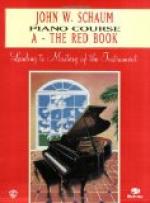“The vital thing in piano playing is to bring out the composer’s meaning, plus your own inspiration and feeling. You must study deeply into the composer’s idea, but you must also put your own feeling, intensity and emotion into the piece. And not only must you feel the meaning yourself, but you must play it in a way to touch others. There are many pianists who are not cultured musicians; who think they know their Beethoven because they can play a few sonatas. In music ’knowledge is power.’ We need all possible knowledge, but we also need to feel the inspiration. One of the greatest teachers of our time holds that personal inspiration is not necessary; for the feeling is all in the music itself. All we have to do is to play with such and such a dynamic quality of tone. Like a country doctor measuring out his drugs, this master apportions so many grains of power for forte, for mezzo, for piano, and so on. This plan puts a damper on individuality and enthusiasm, for it means that everything must be coldly calculated. Such playing does not really warm the heart.
“I believe in teaching tonal contrasts and tone color even to a beginner. Why should not the child form a concept of forte and piano, and so get away from the deadly monotony of mezzo? I have written some little descriptive piano pieces, and my small boy learned one of them to play for me. There is a closing phrase like this,” and Mr. Ganz illustrated at the piano; “it is to be played forte, and is followed by a few notes to be touched very softly, like an echo. It was really beautiful to see how the little fellow reached out for the pedal to make the loud part more emphatic, and then played the echo very softly and neatly. He had grasped the first principle of tone color—namely tone contrast, and also a poetic idea.
“There are so many wonder children in these days, and many marvels are accomplished by infant prodigies. Very often however, these wonder children develop no further; they fail to fulfil their early promise, or the expectations held of them.
“A youthful wonder in the field of composition is Eric Korngold, whose piano sonata I played in my New York recital. I have played this work eight times in all, during my present tour, often by request. To me it is most interesting. I cannot say it is logical in the development of its ideas; it often seems as though the boy threw in chords here and there with no particular reason. Thus the effort of memorizing is considerable, for I must always bear in mind that this C major chord has a C sharp in it, or that such and such a chord is changed into a most unusual one. One cannot predict whether the boy will develop further. As you say, Mozart was an infant prodigy, but if we judge from the first little compositions that have been preserved, he began very simply and worked up, whereas Korngold begins at Richard Strauss. His compositions are full




